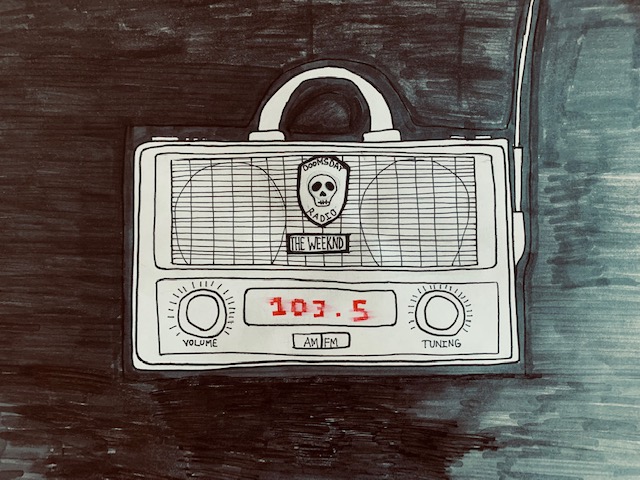Pop superstar The Weeknd returns with dazzling fifth album
Willow Barry’s artistic representation of DawnFM’s old-school radio sound and feel.
January 26, 2022
If the past two years have been beneficial for any person on Earth (Joe Biden, pharmaceutical executives, and cryptocurrency owners aside), that person is very likely Abel Tesafye, a.k.a. The Weeknd.
While The Weeknd has been a star for the better part of a decade, only since the release of his 2020 album “After Hours” has he truly dominated the pop scene. Even after a string of #1 singles in the mid 2010’s, The Weeknd always seemed to be just shy of a household name (my parents might still know him as Selena Gomez’ ex). Of course, that all changed with “After Hours.” Lead single “Blinding Lights” became, according to Billboard, the biggest song of all time. The Weeknd headlined the Super Bowl LV halftime show and made national headlines after being snubbed at the 2021 Grammy Awards. Point being: After Hours was wildly successful. And now, just days into 2022, The Weeknd releases ”Dawn FM.”
Jim Carrey immediately sets the scene. We’re tuned into 103.5, and the world is probably about to end. Speaking as the station’s host, he urges the listener to enjoy “another hour of commercial ‘free yourself’ music,” the ‘free yourself’ altered into a distorted, reptilian voice. Did The Weeknd intend for it to be a critique of our relationship with advertising, perhaps even a critique of capitalism itself? Probably not, but if the shoe fits…
Upon a first listen, it’s tempting to label “Dawn FM” as more of the same. Cryptic lyrics and elaborate synths are integral to The Weeknd’s style, which he doesn’t deviate from. But there’s an ambition here that wasn’t present on “After Hours,” and certainly not its predecessors “Starboy” or “Beauty Behind the Madness.” Take “Take My Breath”: a nearly-six minute epic, the song opens and closes with a lengthy instrumental. Aside from occasional chants of the title, they are lyricless: a mix of three or four note synth patterns, ascending and descending vocoders, and a sometimes asynchronous drum beat. Positioning the track’s story between the two passages emphasizes the impending cataclysm—life, and all our connections within it, is merely another blip in the void. “Make it last forever babe / Do it now or never babe,” The Weeknd breathlessly belts in an addictive couplet, a perfect encapsulation of the rush associated with such a delicate, lustful connection.
Always the object of his eye, The Weeknd sings about, or to, women for the majority of “Dawn FM.” But he approaches the subject in a different way: romantic feelings shed light on his own psyche, revealing deeply felt insecurity, regret, and tenderness (save for “I Heard You’re Married,” a baffling unnecessary ode to adultery with a bafflingly unnecessary Lil Wayne feature). “I see every ice on you / You snatch my soul, I’m crucified,” goes “Don’t Break My Heart.” Never has The Weeknd surrendered himself so earnestly before, or articulated his attraction with such mystique. Similarly haunting is the more twinkling and subdued “Out of Time.” Begging for forgiveness from a past lover, The Weeknd professes his faults. “The last few months I’ve been working on me, baby / There’s so much trauma in my life,” he confides, inviting the listener on a session of desperate soul-baring. It’s the kind of plea for redemption one might voice, ironically, just before the whole thing ceases to matter.
Don’t let it be forgotten that “Dawn FM” is more than another chapter of The Weeknd’s signature dark and passionate fantasies; a few choice songs explore the album’s themes from other angles. “A Tale by Quincy” recounts producer Quincy Jones’ childhood, which was marred by the commitment of his mother to a mental institution. Because of his stepmother, Jones claims, “Whenever I got too close to a woman I would cut her off / Part of that was vindictive and partially based on fear.” Although the comparison is a bit too on the nose, the story is compelling and the delivery thoughtful: a somber spoken-word that brings out the gravelly beauty in Jones’ low register.
On the opposite end of the spectrum, the beginning of “Every Angel is Terrifying” blurs all of the synths and drums heard so far and spits the listener out into a fever dream of commercialism. An eerie, semi-robotic voice unrestrainedly effuses about an initially ambiguous product (soon revealed to be the fictitious movie “After Life”): it is intense, sexy, euphoric, edgy, exotic. Doubling down on the opening track’s vague commentary on consumerist culture, it’s asserted that “‘After Life’ makes your current life look like a comatose snooze-fest.” If you were to compare your life to the world of “Dawn FM,” the statement would likely hold true.
And just like that, you’re pulled out of 103.5. Jim Carrey is back with humanity’s epitaph. It splits the difference between Shakespeare and Dr. Seuss, managing to be nihilistic and comforting at the same time. “If pain’s living on when your body’s long gone / And your phantom regret hasn’t let it go yet / You must not have died in the ways that you must / All specters are haunted by their own lack of trust,” whispers Carrey, in a sense condensing the emotional palette explored up until now.
Perhaps the album’s midsection was nothing but a montage flashing before one’s eyes as the universe collapses.
It would be hard to blame The Weeknd for taking the easy way out here. “Dawn FM” could have simply been a victory lap, another guaranteed number-one album and round of seven-figure royalty checks from Spotify and Apple Music. But instead he conceived his most creative and intimate project yet, and framed it within an apocalyptic radio station to boot. Is he the next Michael Jackson? No, nor will there probably ever be one. But on “Dawn FM,” there’s a case that he might be the closest thing we have.











![The GHS/MERHS senior cross country runners pose together on Senior Night. [Photo courtesy of Manchester-Essex Athletics]](https://thegillnetter.com/wp-content/uploads/2025/10/Screenshot-2025-10-10-at-11.18.29-AM.png)





















